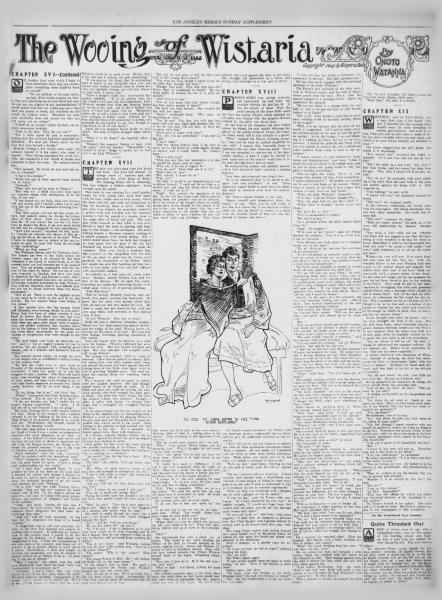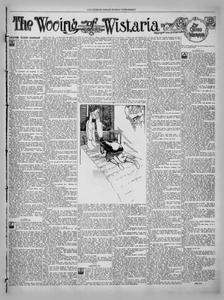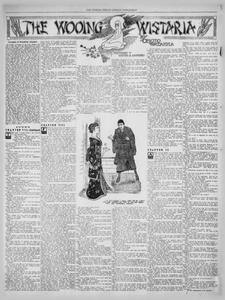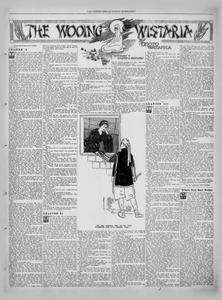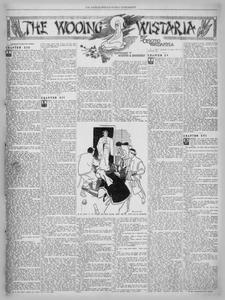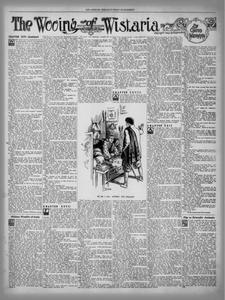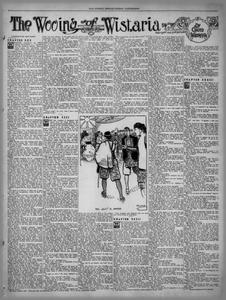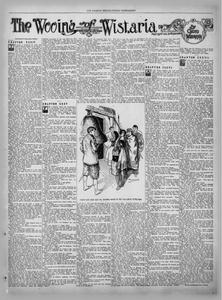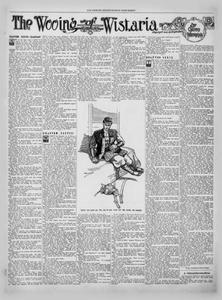Chapter XVI—Continued
“Oh, brother, from your words I begin to have lamentable fears that you contemplate committing some frightful harm to yourself.”
“We are children of the same father, my lady. Your words surprise me. Surely they are unbefitting one of your blood and rank. Do you see any disgrace in my contemplations? I would rather wish that you would urge me to do that deed you appear to dread, for otherwise my life would be without honor. Therefore lay aside your unworthy fears and assure me that you will carry out my wishes.”
“I shall do so, ani-san” (elder brother), she replied, somewhat brokenly.
“That is all, then. Why do you wait?”
“For a letter signed by you as executioner, stating that the execution has been postponed indefinitely. We must put Toro’s safety for the next few days beyond a doubt.”
Hastily writing a few words upon paper, the samurai handed it to his sister, who seized it eagerly. Then, having examined the scroll carefully, she murmured a few words of thanks and prepared to leave the room. The samurai stayed her.
“One moment. By whom do you send this paper to Choshui?”
“I have two couriers.”
“Well, but one of those samurai must attend you to Catzu.”
“Certainly.”
“Then only one can be sent to Choshui.”
“But why so? I shall not leave here until my couriers return with intelligence as to the fate of my son.”
“I can assure you, my lady, that your couriers will not return, and I should advise you to part with but one of the two samurai attending you.”
“Why—?”
“The Mori people will not let this courier depart, rest assured, unless he divulge the hiding-place of their prince. This no samurai would ever do. If your courier has not the wit, therefore, to deceive the Mori, I am very much afraid his life will be endangered by this undertaking.”
“And what samurai,” inquired the lady, quickly, “would not welcome the chance of thus giving up his life in the service of his lord? What I have to decide now is, which of the two samurai to send, for each will claim the privilege of the undertaking.”
“What are their names?”
“Sir Nishimua Matsue and Sir Takemoto Genji. The former has been in my lord’s service for twenty years, and is so trusted by him that whenever I am forced to travel alone, as at the present time, my lord intrusts me to his especial care. You are already acquainted with the history of the other, Sir Genji. He was one of your own comrades in Choshui, but after your exile he deserted the Mori and became a ronin. Afterwards my lord pressed him into our service, and he became attached personally to Lady Wistaria. You will see, therefore, that it is a difficult matter for me to choose between these two brave gentlemen.”
“Not at all. There is not the slightest doubt in my mind as to which is the most fit for the service. Bid the samurai Genji come hither, if you please.”
A few minutes later the big samurai Genji and Shimadzu were bowing deeply to each other. From their low bows of silent courtesy it was hard to believe that these two men had once been the closest of friends and comrades in arms. Now they met again after many years of separation, yet neither exhibited that emotion which lay at the bottom of their hearts. Shimadzu did not even allow opportunity for the usual exchange of compliments, but went straight to the point.
“My good friend, your lady, my honorable sister,” said he, “has an august mission for you to perform, but one fraught with exceeding great danger, and of a delicate and diplomatic nature withal.”
The samurai bowed calmly, as though the fact of the danger were as indifferent a matter to him as the mission itself.
“In fact, she wishes you to carry word to Choshui of the postponement of Prince Keiki’s execution. I need not point out to you the dangers of such a mission. The Mori will insist upon your revealing the place of imprisonment of their prince, and upon your refusing to do so will take drastic measures to compel you. These perils, however, will be to your liking, I am sure.”
“To my liking, that is so,” said Genji, “but—”
“What?” interrupted the Lady Evening Glory. “You hesitate! You do not set off at once!”
“I do not hesitate, my lady,” replied the samurai, bowing respectfully. “I refuse. I do not set off at once because I am not going.”
The Lady Evening Glory could scarcely believe her ears. Never in her memory had a samurai refused to do the bidding of his lord or lady. That Genji, of all samurai, should do so, astounded her. Nevertheless, she brought herself to listen to his amazing words.
“My lady, long before I entered the service of my Lord of Catzu I was a ronin, an independent samurai who owed allegiance to no lord or prince. I was induced to enter your service not for love of your lord or desire to ingratiate myself with the Shogun powers, for, though a deserter of personal reasons, I was of the clan of Choshui, and an Imperialist at heart!”
“Such insolence,” said the lady, furiously, “shall be punished with thy insignificant head.”
“Tsh!” interposed her brother, angrily. “Permit our good friend to speak. I have a liking and understanding for his words.”
“As I have said,” repeated Genji, “it was neither for love of thy lord nor his cause that I entered his service, but because I desired to be near to, and to serve with my life, if necessary, the orphaned daughter of my old friend and comrade, the Lady Wistaria.”
“It is well,” said the Lady Evening Glory, sharply, “that you did not acquaint my Lord Catzu with all this. If my memory serves me correctly, you came to Catzu with great protestations and promises of allegiance and loyalty to his lordship.”
“And,” said Genji, “during the time that I have served the Lord Catzu, there has been no samurai whose allegiance has been more unswerving than mine.”
“And yet,” said the lady, scornfully, “at the first test the allegiance you boast of is found wanting.”
“I respectfully beg to call your attention, my lady, to the error and injustice you commit in making such a remark. In following my inclination at the present time I expect to be discharged by his lordship, or I shall submit my resignation to him. Under the circumstances, I am once more a free samurai, and, being out of service, I am at perfect liberty to serve whom I please. Nevertheless, I shall take delight in obeying any commands you may be pleased to bestow when I am at liberty to do so. At present I am not at liberty.”
“May I inquire,” she asked, with her cold eyes disdainfully fixed above his head, “why you condescended to accompany me?”
“Certainly. I had a fancy that you were about to set off for the place where the Lady Wistaria might be residing. Consequently I besought you to permit me to attend you. What is more, I had reason to believe that the Lady Wistaria would be in need of me. Hence, here I am, and here I remain, the gods permitting.”
“If you suppose, Sir Genji, that by pretending zeal in behalf of my honorable niece you can excuse your conduct towards those in whose service you rightfully belong, you will soon discover your error, I assure you.”
“There I disagree with you,” interrupted Shimadzu, suddenly. “It is my opinion that any old friend’s loyal zeal for the insignificant Lady Wistaria excuses him from any seeming lapses in service to his lord, and in this I believe the Lord of Catzu will agree with me. Therefore, sister, let us call a truce to this harsh and useless exchange of bitter words. Instead, let us beg that Sir Genji will condescend to accept our gratitude for his loyalty to one, who, though insignificant, is yet of our family.”
Again the two samurai bowed deeply to each other. The Lady of Catzu shrugged angry shoulders.
“What is to be done?” she inquired, after a moment.
“Dispatch the samurai Matsue at once with the paper,” said her brother. “Meanwhile”—he turned to Genji—“deign to permit me to lead you to my Lady Wistaria.”
Chapter XVII
The pain was quite gone from the brain and head. The fever had abated. A strange sense of coolness and rest pervaded the whole being of Keiki. The Shining Prince fell to dreaming, this time without a hideous nightmare being wrought upon his mind.
Once more he was standing in a royal garden, where the little winds blew about him laden with the faint, subtle odor of early spring; where the birds clattered and cried out indignantly at him for disturbing them so early; where the sun arose from behind the mountains veiled in a golden cloud and traveled over the heavens, pausing to tint the waters of a slender river to the magic glow of blood and gold. The soft, glad winds caressed as they called to him now. Moved to bend the knee in greeting and homage, he had become a sun-worshipper. He stood waiting beneath a flowered casement, waiting in a silence pregnant with inward feeling. Not a sound stirred about him; the birds had dropped to sleep again; but the glory of the sun had deepened and spread its full radiance upon the casement. Then very slowly a maiden’s face, like a picture of the sun-goddess with the halo of the sun about it, grew into the vision, until gradually the dream-eyes of the Prince Keiki saw naught else save that haunting spiritual face, with its eyes laden with love and still suffused with unutterable sadness.
As suddenly as it had come, the vision faded away. Darkness passed between him and the face of his dreams. He sat upon his couch, stretching out imploring, beseeching hands as he called aloud, with a cry of piercing pleading:
“Fuji—Fuji-wara!”
Then he became dreamily conscious that soft hands were gently pushing him backward. He knew that her arms were pressed about him, that she had put her face against his own. He tried to speak, but she closed his lips wither her own upon them, and answered, in that sighing voice of hers:
“It is I, Wistaria! Pray thee to sleep!”
Keiki fell into a delicious, dreamless slumber. Beside him, her arms supporting against her bosom the weight of his head, Wistaria knelt, unmoving, for the space of an hour. Her eyes had that strange, brooding, guarding expression of the mother.
Some one tapped with the lightness of a child upon the fusuma. Wistaria tightened her arms about her love. Her face became strained and rigid. Her eyes enlarged with mingled terror and savage defiance.
The tapping was repeated. Still she made no response. There was an interval of silence. Then the sliding door was softly pushed aside. Some one entered the room, and stood against the wall looking down at the little, silent figure with its face of appealing, helpless agony. The next moment the samurai Genji was kneeling beside Wistaria.
For a moment she could not speak, so intense were her mingled emotions. She had thought herself bereft of all friends on earth. In her father and aunt she could see nothing but menacing enemies who had assumed the dark guise of fiends. Yet here was Genji—Genji, her own, big samurai—whose very presence brought a sense of safety and repose. A strange little laugh, half a strangled sob, struggled through her lips.
In one glance Genji saw that the weight of the Prince in her slender arms was benumbing them. Without a word he lifted the sleeping Prince in his own arms and put him gently back upon the padded robe which served as his couch. Then turning to his mistress he half assisted her, half lifted her, to her feet. For a moment she leaned against him, dizzy with weakness.
In a broken, piteous, helpless fashion she began to cry against his breast, the pent-up anguish of many days finding its outlet.
Genji gently led her across the room, beyond the possible awakening of the Prince. His big voice, hushed to a whisper despite its huskiness, was as soothing as a mother’s.
“Are moshi! See, the big Gen is here. All is well! Very well!”
“Oh, Gen!” she sobbed. “I do not know what to do!”
“Do? Why, we must cease to weep, so we may have the strength to minister to the sick.”
“Y-yes—I will cease to weep,” she whispered, brokenly. “I—I will do so.”
“That is right.”
“And you will not let them harm him, will you, Gen?”
“No! I swear by my sword I will not!”
“You are so good and strong, Gen!”
Placing his hands upon her shoulders he held her back, then gently wiped the tears from her face.
“Hah!” he cried. “Now she is once again the brave girl. That is right. She is the daughter of a samurai, and cannot weep for long.”
She tried to smile through her tears, but it was a very pitiful little smile which struggled through the mist.
“Now,” said he, “tell me everything.”
“Do you not know all?” she asked.
“No, I do not. I am in darkness as to how your lover comes to be here, wounded and ill; but I surmise that he was captured while on his way to Choshui and prevented from warning his prince.”
“You do not know,” cried Wistaria, looking up into his face with startled eyes, “that he is the prince himself?”
“The prince! Who is the prince? What prince?”
“The young Prince of Mori. He”—she indicated Keiki—“he is the same person.”
It was Genji’s turn to start. He made a movement towards the Prince, but Wistaria grasped his arm and stayed him.
“Nay, do not go to him. He is so tired, Gen. He has been awake, though unconscious, all night long, and he needs the honorable rest the gods have denied him so long.”
“But you do not mean to tell me that your lover is the young Mori prince?”
“Yes, even so, Gen, though I knew it not until—until they brought him here.”
“Brought him here! Why—but this man—the Prince Mori is condemned to death! He was found guilty of treason—he—oh, it is quite impossible!”
“Alas! but it is true.”
“You do not mean that your father brought him here under penalty of death?”
Her head was bent forward. She covered her face with her sleeve.
“Shaka!” exclaimed Genji. “We must do something at once.”
“Yes, oh yes! You, Gen, you will take him away—will you not, Gen?—and protect him, for if you do not they will kill him, or force me to marry with him.”
“Force you to marry with him!”
“Yes. Do you not understand? I am only an Eta girl.”
“I know that.”
“And my father believes that if he were to marry me to the Prince he would legally become an outcast, and it would break his father’s heart.”
“That is very true.”
“Then you see, Gen, how imperative it is that he should be taken away at once.”
“Why, no, I do not so regard it.”
“You do not? Then what am I to do?”
“Marry him at once.”
“But, indeed, I cannot do so.”
“Why not?”
“Oh, Gen, it would be too humiliating for him to debase himself. I could not be so false as to deceive him and drag him down from his high estate. I could not do it.”
“Pugh! You overrate the ignominy of the Eta. In the old days when your father married among them the prejudice was at its bitterest. He is not aware of the changes which are rapidly taking place in the thought of the people of Japan to-day, nor does he know that this very prince represents to the people that new era which is about to dawn wherein all men will have equal rights and privileges. Your honorable father has lived only in his own sorrows, knowing little of what is taking place in his country. Take advantage of his ignorance, I advise you.”
“But he would never forgive me,” she said.
“Who? Your prince? Never forgive you for marrying him! Why, I thought he had wooed you for that purpose!”
“Yes,” she sighed, “but he did not know the truth then. Perhaps if he had known of my lowly station—”
“It would have made no difference. I tell you I am well acquainted with his family of Mori. They are a proud but not ignoble race, and this new scion has shown a braver and better blood than all of his august ancestors.”
“I cannot do it,” she said, shaking her head despairingly. “So do you, pray, Sir Gen, assist me to put him in hiding somewhere.”
“Tsh! That is impossible. Why, see, he is a big fellow. We could not carry him far, and the place here is surrounded by spies. He would meet a worse fate than if—”
She became paler and shivered visibly.
“I do not like to hear you speak so,” she said.
“I do not like to see you act so, my lady,” said Gen. “What! You would desert your lover when he most needs you!”
“Oh, Gen, no! I did not say that.”
“When there is a way by which you can save his life, you refuse to do so? Very well, then; better deliver him up at once to his executioners.”
“Oh-h!”
She interrupted him with a sharp cry of fright. The sound of her voice reaching the Prince as he slept, he turned uneasily on his couch, sighing heavily. Genji and Wistaria listened to him in breathless silence. Then, with her face turned towards the Prince, Wistaria moved close to his couch, whispering tremulously:
“Yes, yes, I must do it. It is the only way—the only way!”
“That is right,” said Genji, patting her hand reassuringly.
She walked unsteadily back to her lover. Once more she sank down on her knees beside him. Her face wore an expression the big samurai could not bear to look upon. He moved very silently and stood against the door of the chamber, straight and immovable as a statue, and strong and invinciple as a war god on guard.
Chapter XVIII
Prince Keiki was pacing restlessly and impatiently up and down the chamber wherein he had lain ill. It was the month of June. From the small opening of the doors Keiki could see that the uneven hillocks which appeared on all sides were blazing with the gorgeous flowers colored by the yellow sun above them.
At the door of the chamber, his arms folded across his breast, his eyes quietly following the glance of the plainly irritated Prince, the samurai Genji stood, still in the attitude of a guard.
“Why,” inquired the Prince, frowning savagely, “may not the shoji be pushed completely to one side? I suppose this honorable house is fashioned like any other Japanese abode. Since I am not permitted to venture out of this honorable interior, at least I might be allowed to look upon more of the outside world than is to be seen through such a narrow space.”
He indicated the screens, only partially opened, which half discovered, half concealed, a sloping balcony.
Very deep and respectful was Genji’s bow.
“It is my distasteful duty to be forced to disagree with your excellency,” he said. “Your highness’s august health is such that your chamber must be sheltered even from the summer breezes.”
The Prince stopped sharply in his walk.
“Spare yourself such imaginative effort, Sir Genji,” he said. “That, you are well aware, is not the true reason why I am deprived of sufficient air, and am forced to remain in a room with my shutters closed so that not even the breath of summer may enter.”
At Genji’s second obeisance, the Prince, with an impatient motion, commanded him to case, and to give his undivided attention to his remarks.
“Now will you do me the kindness to inform me what all these mysterious precautions mean? Wait a moment. Do not speak, for I perceive you are about to utter some further prevarication. Think before you speak, and try to see that it is useless to attempt to deceive me.”
“Well, my lord,” said Genji, “knowing as you do the peril in which your life will be placed if—”
“Oh yes, I perceive all you would say. I have recently been rescued from a blood-thirsty executioner; I must remain in hiding for some time, and so on; but what I wish to understand is why is it necessary for me to continue imprisoned?”
“Well, my lord, you would not wish a Shogun spy to catch a glimpse of you by chance?”
“I fear no spy,” said the Prince, with contempt. “If I were permitted my own way,” he added, savagely, “I would not linger here, but would start out alone, and cut my way through such worms and vipers.”
“If you wish to do so,” said Genji, with some asperity, “I shall take no measures to prevent you; but I had thought your highness desired to remain here at all events until after your wedding.”
The young Prince sighed, and, seating himself on a small lacquer stool by the parted doors, he rested his chin upon his hands and stared out gloomily at the landscape.
After a moment, in a gentler voice he rejoined:
“Is it not yet time for her to come?” without turning his head.
“No, my lord.”
The Prince sighed again.
“I once prided myself upon my habit of early rising,” he said. “Now it has become a nuisance.”
Silence again, and then:
“Sir Genji, what has become of the Lady Evening Glory? She has not returned to Catzu?”
“No. She still condescends to accept my humble hospitality.”
“I have not seen her lately—a fortunate circumstance, by-the-way. The lady oppresses me.”
“She has been much engaged with the marriage garments of the Lady Wistaria.”
The Prince’s face softened at the mere mention of Wistaria’s name, and the look of impatience passed from his face. For a time he seemed plunged in a pleasing reverie. Again he questioned the
samurai.
“Do you not think it a strange fancy for my lady to wish to be married here at your house instead of at Catzu?”
“Not at all. Your health is such that an ordinary wedding would be harmful; besides, think of the danger!”
“Well, it is my opinion that the state of my health is exaggerated. All I need to drive away my paleness quickly is the open air and the golden sunlight. As for the danger, I was not thinking of a wedding in Catzu, but one in my own province. I should be perfectly safe there with my own samurai to protect me, and a half-dozen other southern clans ready to come to my assistance.”
“I cannot conceive of your excellency’s impatience and dissatisfaction,” said Genji, “when I recall that you are about to be wedded soon, and to one for whom any prince would be only too glad to sacrifice everything.”
“You are right, Sir Genji. Yet is it not strange that, despite all this, I feel melancholy. I cannot understand it.” He paused, and turned on his seat to look back at the samurai. “Sometimes it appears to me that I have caught this sadness of spirit from my lady herself.”
“What, the Lady Wistaria? Impossible.”
“It is true,” said the Prince, thoughtfully.
“Why, she sings half the day like a bird—”
“Whose heart is broken,” quickly ended the Prince.
“She plays like a child—”
“Who is commanded to rejoice.”
“Her soul is as gay—”
“As a priestess whom the black temple shuts from life.”
“Pugh! She laughs—”
“With tears in her throat;” again the Prince finished the sentence. “Yes, it is so, I tell you. I am not deceived.”
“Your affection, my lord, causes you to imagine things that do not exist.”
“No, my affection but increases the acuteness of my perceptions.”
“If you will permit an unworthy vassal to venture an opinion, I would say, my lord, that for one about to wed in a day, your excellency wears a most funereal countenance.”
The Prince arose abruptly, as though he would shake off some oppression that beset him.
“Let me tell you, my good fellow,” he said, approaching Genji more closely, “when one we love appears to us to be cloaking behind a mask of painful gayety some secret sadness, the world is apt to wear a haggard aspect which one’s own self must reflect. If you repeat that my imagination but conjures up such fancies, then I will say that I must be insane.”
Silently, for the space of a few moments, the two men remained looking into each other’s faces. They started simultaneously at the soft patting of approaching footsteps.
“One request, Sir Genji,” whispered Keiki as the footsteps drew nearer. “Will you for once relax your guard and permit me to be alone with—”
“But—”
“You can guard my person just as well outside, and should any one attempt to attack me you will certainly be made aware of the fact by whatever noise a pair of lungs can force.”
“Her aunt would consider it unseemly,” said the samurai, with some hesitation.
“I do not make it a request,” said the Prince, patiently, “but merely beg the favor.”
A light tap on the door, and the next moment Wistaria had entered the room. Her arms were full of flowers, flaming red and yellow blossoms that grew wild on the hills, while about her garments clung the odors of the fields and the mountain. She was damp and sweet with the morning dew shining on her hair, clinging even to her face and arms.
“What!” cried Gen. “You have been out already?”
She nodded, smiling wistfully over the flowers, which the Prince silently took from her arms and set upon the floor. His eyes never relaxed their gaze from her sweet face.
“My lord’s chamber,” she said, as she shook the dew and a few clinging leaves from her kimono, “is so barren of the beauty of summer that I thought the fields might spare something of their wealth.”
Keiki turned an imploring glance to Genji. The samurai turned hastily to the door.
“Well, then,” said Genji, “I shall go and bring you some honorable water fro the flowers.”
The moment Genji had left the room the Prince seized Wistaria’s hands impulsively.
“Wistaria,” he cried, “now I have some questions to put to you.”
One startled, upward glance at him she gave. He took her face in his hands, compelling her eyes to meet his own.
“Why are your eyes so dark?” he asked.
She attempted to smile.
“The gods—” she began.
“No,” he interrupted, knowing in advance what she was about to say, “but here, and here.” He passed his fingers gently over the dark shadows that framed the pitiful eyes.
“Have they not always been so?” she asked, with a pathetic attempt at lightness which did not deceive him.
“No,” he replied, almost vehemently. “When first the gods blessed me with the joy of beholding you, they were not so.”
“Well,” she murmured, tremulously. “I am becoming honorably older. That is all.”
“No, that is not the reason,” he cried, passionately. “A few months could not have wrought the difference, nor the other changes I perceive in your face. The rose is gone. You are pale and too frail. Your lips—ah, I cannot bear it!”
With an exclamation of pain he broke off.
An expression of fright appeared in her face. Her hands clutched about his.
“My lord,” she cried, “you—you do not think that I—that I have ceased to be beautiful?”
“No, no. You are more beautiful than ever. You could not be otherwise than beautiful, my beloved, but you appear to me so frail that I am beginning to believe you are some spirit. Tell me, do tell me, what has wrought this change in you?”
For a moment she remained silent. Then she laughed. Her hands, with a little, childish motion of delight, she clapped.
“Wait!” she cried, breaking from his arm. “I will show you the cause.”
She ran across the room and brought a little mirror, which she polished with her sleeve as she returned to him. Then leaning against him, she held it before his face, while she put her own cheek against his.
“Look within, Keiki-sama. Said the gods: ‘Such a pale and wan Keiki will need a companion, so we will make the Lady Wistaria’s face to match his!’ So they did so.”
With a gesture of despair, he pushed the glass away.
“No,” he said hoarsely, “for mine is pale and thin from much illness, while yours—”
“From love,” she said, in a breath.
Chapter XIX
“Wistaria,” said the Prince Keiki, with a very firm clasp of her hand, “just now I insisted that the samurai Genji should cease his futile deception by useless prevarication. And now I ask you, I beg you, not to hide under a cloak of levity any secret trouble which you may have, and which I as, your future husband, am entitled to know.”
The mirror slipped from the girl’s hand. She stared at it hopelessly.
“Now answer me,” continued her lover, insistently. “Is it not true that you are in trouble?”
“Yes,” she said, in a low voice; “yes, but—” Her voice broke, and she turned her face from his gaze. “But, alas, I cannot tell it to you, my lord.”
“Nay, do so,” he entreated, with such pleading in his voice that she came back to his arms and nestled against his breast with a little wounded cry.
“I am waiting,” he said, softly.
“I cannot tell you,” she murmured against his breast.
“Why not?” he inquired, quietly.
In her nervous restlessness she broke away from his arms again. Her hands noiselessly clapped each other repeatedly. She could not remain still.
“Why not?” repeated the Prince.
“There are many reasons,” she said, in a low voice, still maintaining the distance between them.
“Nay, think a little while, and see whether your heart will not suggest to you that the mere telling of your troubles to me may be their solution. Remember I shall be your honorable husband very soon”—he smiled a trifle sadly—“and then I shall command you to tell me the truth, you know.”
Wistaria sat very still now. Ever since Genji had come upon her that first day with the wounded Prince in her arms Wistaria had been a prey to the utmost despair and anguish. The infinite faith and trust of her lover filled her continually with a greater horror of her deceit, for which she could not forget, not for one moment, the part she had been forced to play in the undoing of the Prince. How could she add to her other iniquities by inveighing this noble and generous-hearted Prince into a marriage which would not fail to debase him? And yet she had no alternative, for otherwise his life would be the forfeit. Was it possible for her to tell him all this? Would it be, as he had said, a solution of her misery to confess her own deceit and warn him of the danger in which he stood, that of marrying into an outcast family?
As she thought thus sadly, the gentle voice of her lover brought the tears to her eyes. But she held them back, almost feverishly placing a greater distance between herself and the Prince. In that moment when his tender eyes held hers in their gaze, while he trustfully waited for her to speak, she was ready to tell him everything.
“You are about to tell me all,” he said, as though he understood her unspoken volition. “Do not mistrust me. Believe in my adoration for you. Give me thy heart completely.”
A sudden shivering took possession of Wistaria. Instead of speaking, she drew her sleeve across her face, a characteristic habit with her when in despair. Gradually her head sank forward, until she knelt at his feet in an attitude of humility.
“Nay, do not kneel,” he cried, “nor hide thy face from me. Do not so, I beseech thee.”
Having permitted his assistance in rising, she freed herself from his encircling arm.
“Look at me, my lord,” she cried. “Tell me, what do you see?”
“A maiden as beautiful as the sun-goddess and as good—”
“Nay, then, do not speak so. Look at me again, my lord. Have you then found such pleasure in my beauty that you have not even remarked my garments?”
“Your garments?”
Bewilderment was in his face.
“Yes. Are these the silks, my lord, worn by the ladies of your rank?”
“Nay, but though I cannot conceive why you should be garbed in cotton, yet I see no disgrace in the fact. Perchance the samurai Genji is honorably poor, and you are so courteous as to dress in homely garments while a guest of his honorable household.”
“I am not a guest of his household, my lord.”
“But—”
“I know it has been told you so. Nevertheless, this is the house of my father.”
“I do not understand,” he exclaimed.
He added immediately, “If it is that your honorable father is poor—”
“You are wrong, my lord. My father is in the service of the government. His remuneration is ample.”
“Then do explain to me the reason why you are so garbed and situated.”
“Because it is so enacted by the law,” she said.
“The law!”
“I am an Eta woman.”
“An Eta! Impossible!”
“That was the offense for which my father was banished—because of his marriage to an Eta maiden.”
The Prince stared at her aghast. She stood still as if made of stone. Her lover’s silence was due to his repugnance at this revelation.
To Be Continued Next Sunday
